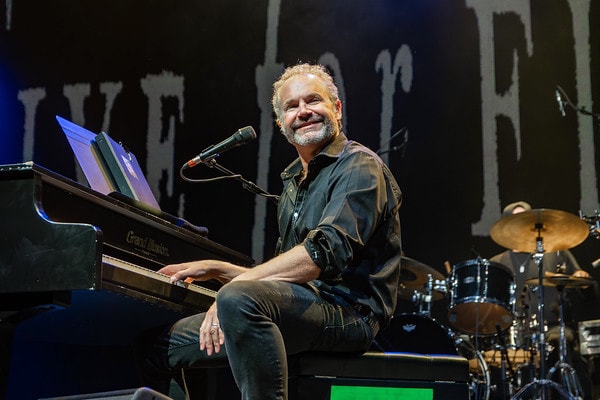John Ondrasik Blasts Music Industry’s ‘Historic Moral Collapse’
Five for Fighting singer shreds musicians for ignoring Hamas, antisemitism

John Ondrasik won’t land on any Grammy shortlist for his latest song.
The singer known as Five for Fighting channeled his rage at not just the Oct. 7 Hamas attacks that killed 1,200 Israelis but the ensuing wave of antisemitism across Western culture.
The result? The haunting ballad “OK” married Ondrasik’s beautiful voice with atrocities the likes of which we haven’t seen since the Third Reich’s reign.
The “Superman” singer shared the song’s creative journey with The Hollywood in Toto podcast.
“Some songs just kind of write themselves,” says Ondrasik, whose video accompanying the song skewers those cheering on attacks so vile they mirrored the Holocaust atrocities. “For example, ‘Blood on My Hands’ about the Afghan withdrawal, that just came from anger. And the fact that a friend of mine, you know, was going down to rescue Americans we abandoned, risking her life [in the process] … I wanted to name names. And before I knew it, I had the song.”
The singer-songwriter’s “Can One Man Save the World,” a tribute to Ukraine’s president Volodymyr Zelensky “also came very quickly,” he recalls.
That wasn’t the case with “OK.”
First, he processed the horrors of the initial attack. Then, he watched college students celebrate the slaughter and university presidents demand we consider the “context” behind calls for genocide against the Jews.
“Where is everybody? Nobody’s saying anything, with the exception of a few people [like U2 and Madonna] … I had the idea of, ‘It’s a time for choosing, you know, evil is on the march,” he said.
At that point, “The lyrics came very quickly,” he notes. The song echoed a theme shared by New York City Mayor Eric Adams, whose fiery speech following the attacks hit him hard.
A culture where people celebrate torture, rape and murder isn’t well. Or, as the Mayor put it, “we’re not all right.”
“So that idea stuck in my head,” he explains.
Please set aside time to watch this video, and share it. Thank you for using your talents to bring this to us, @johnondrasik.
Five for Fighting's 'OK' a Chilling, Powerful Reminder of the Horror of Hamas' Attack on Israel https://t.co/CxzC0On8iJ
— Jennifer Van Laar (@jenvanlaar) January 22, 2024
The video accompanying the song features horrific images, headlines ripped from news outlets and scenes depicting hope for a more humane tomorrow.
The track also calls out his fellow artists for mostly taking a knee on one of the most consequential evils of our time.
“The music-based industry has had a historic moral collapse. I was honored to play the Concert for New York. I saw the world come together [after 9/11]. I saw artists come together,” he says. “We’re supposed to be on the right side of history. And certainly in this case we are not.
“This doesn’t have to be political. I mean, just speaking out against October 7, and the antisemitism across the country seems like the ultimate moral no brainer. Why is there such silence? I also think it’s a sign of our moral collapse as a culture. It’s just another symptom,” he adds.
Some artists may fear the repercussions of any pro-Israel statement. And Ondrasik understands that sentiment.
“They’re scared. They’re scared for their families. They’re scared that their concerts will be protested, that their fans will be at risk,” he says. “And that’s true. I mean, I’m not gonna say that’s not true. I feel a little scared by putting this song out.”
RELATED: ONDRASIK SAYS YOUTUBE CENSORS SELECT POLITICAL VIEWS
Ondrasik isn’t aggressively political, but he’s sympathetic to select right-leaning causes. He previously attended meetings for the Friends of Abe, a secretive club that let conservative artists meet, network and, in some cases, let their emotions out.
“It was a get-together where people could talk about what was going on in the world without having their job at risk. And there are a few names you know [at those meetings]… but it wasn’t about them,” he says. “Because if you’re Jon Voight, you’ll probably still get hired. It was about cameramen, directors and makeup artists and it grew to thousands of people. And we would have these lunches and people would go around the table and just talk about what they feel. And it would be like an AA meeting. People would cry, just the fact that they could say what they feel without the fear of retribution.”
To hear more about the creative process behind “OK” and how the mainstream media reacted to its release, listen to the entire interview at The Hollywood in Toto Podcast.
